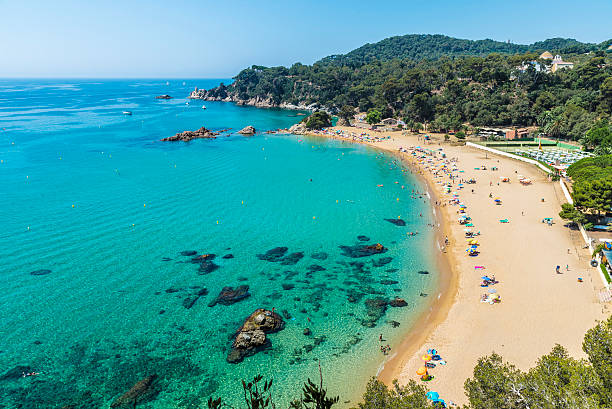Home » Spain Travel News » Spain’s Mallorca Battles Economic Decline As New Breed Of Low-Spending Tourists Threaten Local Business Survival
Published on
August 16, 2025
Spain’s Mallorca is facing an economic crisis as a surge of budget-conscious tourists flood the island, spending less on local businesses and attractions, which is severely impacting revenues. This shift in tourist behavior is leaving restaurants, beachside services, and other local businesses struggling to survive, pushing the island’s economy to the edge.
Amid a challenging summer in Mallorca, with grievances arising across various sectors, tourists are being increasingly blamed and criticized.
Last month, a new type of holidaymaker emerged in Mallorca, Spain, sparking a wave of debate and concern among local businesses. Dubbed the “sandwich tourist,” these travelers are characterized by their preference for skipping restaurants in favor of shopping at local supermarkets. Rather than indulging in Spain’s renowned dining experiences, they opt to create their own sandwiches with ingredients from the stores, spending less money in eateries. According to some reports, this behavior is partly to blame for the downturn in restaurant revenues, as these tourists are instead channeling their funds into flights and hotel stays, leaving fewer euros for local dining establishments.
As if this wasn’t enough, another type of tourist has now arrived on the island, and this one is also under fire for contributing to the financial struggles of the local economy. Following a recent report from the Association of Temporary Services Concessions and Operations in the Maritime-Terrestrial Public Domain of Mallorca (Adopuma), which revealed a staggering 20% decrease in revenue in July, a new term has been coined: the “diesel tourist.”
The so-called diesel tourists are characterized by their habits of exploring the island while spending as little money as possible. Unlike their sandwich counterparts, they don’t even seem to be indulging in the occasional self-made meal. These travelers are accused of visiting Mallorca’s popular attractions without making any significant purchases. They stroll through the island’s picturesque landscapes, enjoy the beaches, and perhaps even bring their own sandwiches, but they avoid spending money on sunbeds, drinks, or other beachside services. According to local business owners, this lack of spending is contributing to the decline in revenue on the beaches and beyond, further exacerbating the economic challenges of the summer season.
It’s clear that, for many businesses in Mallorca, these tourists are being viewed as the latest culprits in a trend of declining profits. With businesses already struggling to make up for lost revenue after the pandemic, the situation is proving to be a difficult one. However, while it’s easy to blame these tourists for the economic woes, the role of local authorities in addressing the broader issues seems to be a point of contention. The criticism of tourists often ignores the responsibility that local officials might have in preparing the island for a more sustainable tourism model. Instead of directing attention solely at tourists’ spending habits, it may be time to ask how the tourism infrastructure can better cater to the diverse needs of travelers, both in terms of affordability and experiences.
Despite the growing criticisms, one can’t help but wonder if the blame game will truly help resolve the problems facing the local economy. It seems as though each new type of tourist that arrives in Mallorca is quickly labeled as a contributing factor to the financial difficulties, but little is done to adapt to changing visitor behaviors. The reality is that tourists, whether they opt for a sandwich from a supermarket or prefer to enjoy the island’s natural beauty without spending much money, are simply responding to their own travel preferences and budget constraints.
Local authorities may be left to wonder how they can address the drop in tourism revenue, but a deeper look into the sustainability of the island’s tourism model could provide valuable insight. Perhaps the real solution lies not in vilifying these so-called “sandwich” or “diesel” tourists, but in creating a more flexible, affordable, and diverse set of offerings that appeal to a wide range of travelers. This would allow businesses to thrive regardless of which type of tourist is visiting.
As Mallorca continues to grapple with its tourism challenges, it’s likely that new labels will emerge for different types of tourists. The key, however, may lie in understanding the evolving expectations of travelers and ensuring that the island’s offerings align with those desires. Only then can Mallorca shift from blaming tourists to finding solutions that benefit both the local economy and the visitors themselves.
